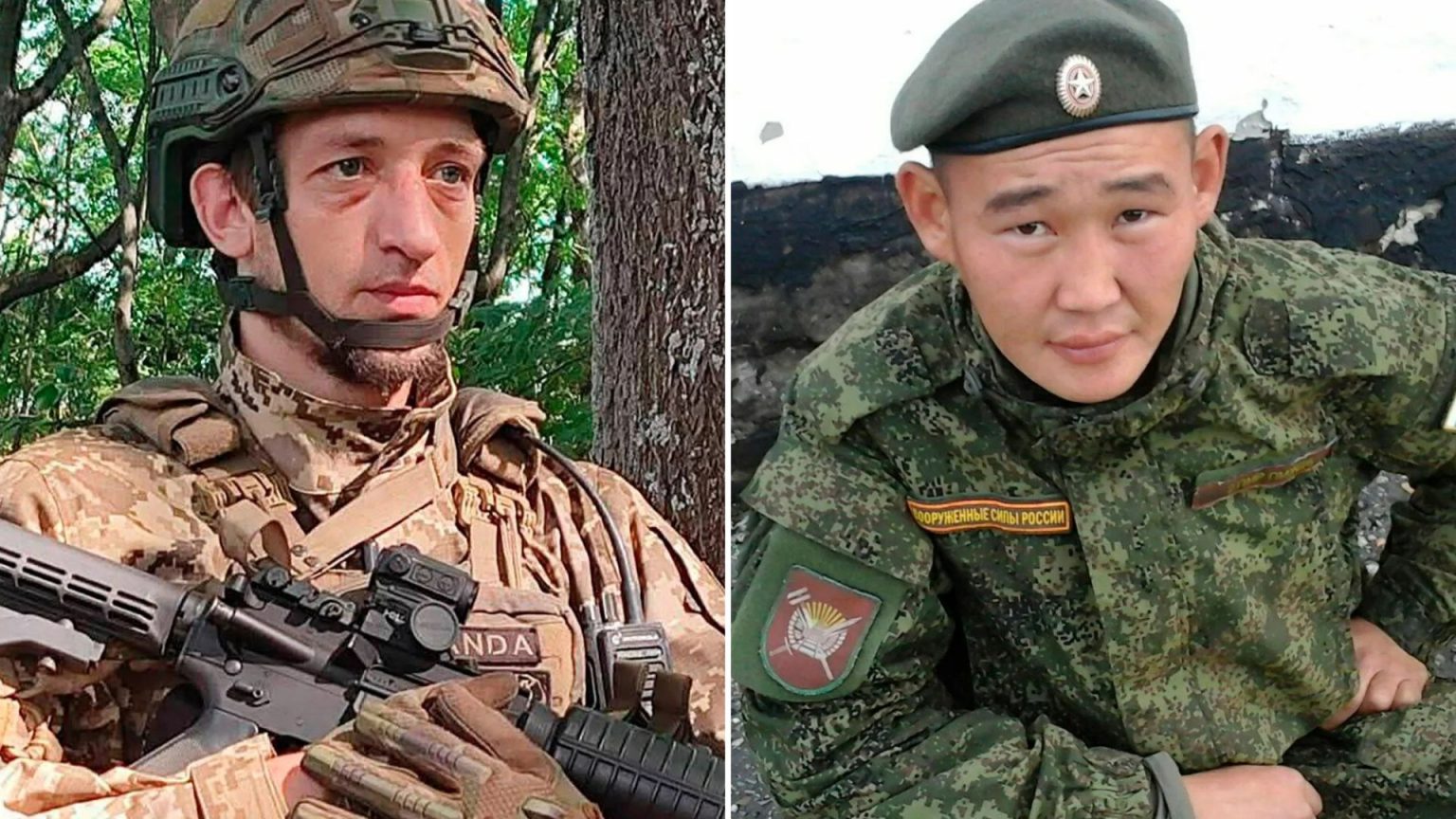The brutal reality of war was captured in a chilling video that emerged last week, depicting a savage knife fight between a Ukrainian soldier and his Russian adversary. The Ukrainian, later identified as 30-year-old Dmytro Maslovsky from Odessa, ultimately succumbed to his injuries, but not before uttering words of unexpected respect for his killer. The Russian soldier, identified as Andrey Grigoriev from Yakutia, engaged in a harrowing hand-to-hand combat with Maslovsky after their initial exchange of gunfire proved inconclusive. The fight, documented from Maslovsky’s helmet camera and later supplemented by drone footage, offered a stark and unsettling glimpse into the primal nature of close-quarters conflict.
The initial footage showed the two soldiers, their faces bloodied and contorted in exertion, locked in a desperate struggle. Maslovsky, realizing the futility of his situation, poignantly bids farewell to his mother before pleading with Grigoriev to end his suffering. “Let me catch my breath…It hurts a lot…Let me go quietly,” he implores, his words capturing the agonizing pain and resignation of a dying man. In a remarkable display of respect amidst the brutality, Maslovsky acknowledges Grigoriev’s prowess, calling him “the best fighter in the world.” Grigoriev, seemingly moved by his opponent’s plea and unexpected praise, grants his wish, retreating and allowing Maslovsky a moment of peace before his final moments.
Subsequent drone footage provided a broader perspective of the encounter, showing the two figures grappling on the ground before Maslovsky detonates a grenade in a final attempt to end his life. Grigoriev’s later account revealed that the grenade only further wounded Maslovsky, prompting him to return and mercifully shoot the dying soldier to end his suffering. This act, while seemingly harsh, was described by Grigoriev as a necessary measure to alleviate Maslovsky’s agony, highlighting the complex and often grim choices faced by soldiers in the throes of combat.
In an interview following the incident, Grigoriev, bearing his own injuries from the fight, including a partially severed ear, recounted the events leading up to the fatal encounter. He explained that he and a comrade had been on a mission to plant a Russian flag, symbolizing their advance, when they were ambushed by a Ukrainian drone. His comrade was killed instantly, leaving Grigoriev to continue alone. He found refuge in a stone shed, where he was confronted by Maslovsky. Recognizing the inevitability of the situation and adhering to his belief that surrender was not an option, Grigoriev prepared to fight to the death.
Grigoriev’s narrative sheds light on the strategic context of the fight, revealing that Maslovsky’s engagement served as a delaying tactic, allowing time for a Ukrainian drone to arrive. The drone’s explosion concussed Grigoriev, momentarily disorienting him before Maslovsky launched his attack. The ensuing struggle devolved into the brutal knife fight captured on camera, ultimately leading to Maslovsky’s demise. Grigoriev’s account underscores the chaotic and unpredictable nature of warfare, where individual encounters can carry significant strategic implications.
Grigoriev’s reflection on the encounter reveals a nuanced perspective, highlighting the strange dichotomy of respect and brutality that can coexist in war. He emphasized the ingrained values of his upbringing, which stressed the importance of retaining humanity even in the most extreme circumstances. He recalled Maslovsky’s final words of gratitude and respect, acknowledging the shared understanding between the two men that only one would survive the encounter. This mutual recognition of the other’s fighting spirit, expressed amidst the savagery of hand-to-hand combat, offers a poignant commentary on the complexities of war and the enduring human capacity for empathy even in the face of death.
The incident, captured in its raw and visceral detail, serves as a stark reminder of the devastating toll of war on individual lives. The story of Dmytro Maslovsky and Andrey Grigoriev transcends the typical narrative of opposing forces, offering a glimpse into the shared humanity that can persist even in the midst of conflict. Maslovsky’s final words of respect, and Grigoriev’s subsequent reflections, serve as a testament to the enduring human capacity for empathy and dignity, even in the most brutal and unforgiving circumstances. This unexpected display of mutual respect amidst the savagery of war offers a complex and thought-provoking perspective on the human condition in times of conflict.




